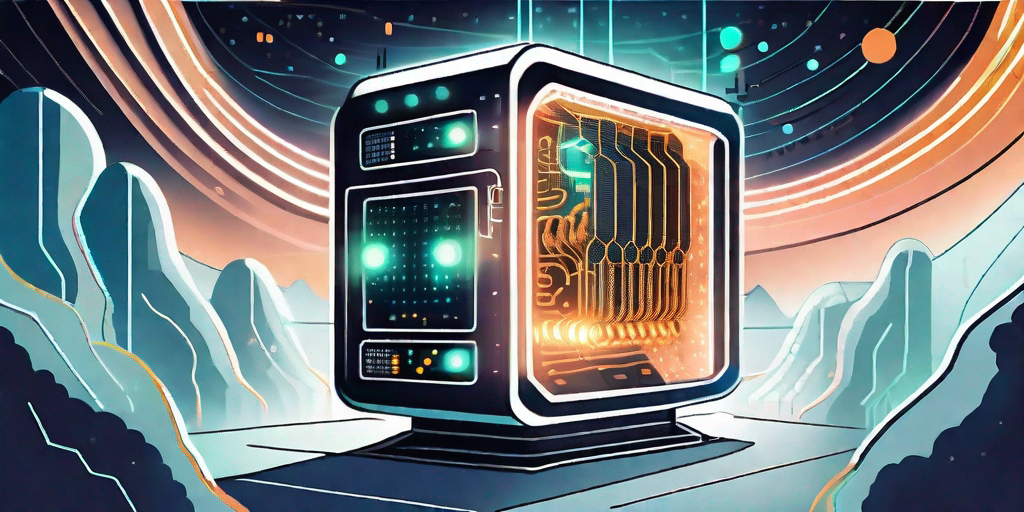Quantum Computing Insight from an Innovation Futurist

Quantum Computing Insight from an Innovation Futurist
Quantum computing is a rapidly advancing field that promises to revolutionize the way we process information. As we navigate this intricate world of qubits and superposition, it becomes increasingly crucial to seek guidance from those who possess a deep understanding of quantum computing and its future implications. In this article, we will delve into the remarkable insights provided by an innovation futurist, exploring the basics of quantum computing, the role of an innovation futurist in this domain, the challenges we face, and the potential solutions. Let's embark on this enlightening and captivating journey together.
Understanding the Basics of Quantum Computing
Before we dive headfirst into the intricacies of this cutting-edge technology, it's essential to grasp the fundamentals of quantum computing. Unlike classical computers that rely on binary systems (bits represented as ones or zeros), quantum computers utilize quantum bits or qubits.
Qubits are the building blocks of quantum computing and possess unique properties that set them apart from classical bits. One of the most mind-boggling aspects of qubits is their ability to exist in multiple states simultaneously due to a phenomenon known as superposition. This means that a qubit can be both a one and a zero at the same time, opening up a whole new realm of possibilities for computation.
This remarkable attribute enables quantum computers to perform complex calculations exponentially faster than classical computers. With the ability to process vast amounts of information simultaneously, quantum computers have the potential to revolutionize fields such as cryptography, optimization, drug discovery, and more.
However, harnessing the power of qubits is no easy task. Qubits are incredibly delicate and highly susceptible to environmental disturbances. Even the slightest interaction with the outside world can cause them to lose their quantum properties, leading to errors in computation.
To counteract this, researchers are tirelessly working on developing error correction techniques and novel hardware architectures that can mitigate the impact of these disturbances. By implementing error correction codes and creating stable qubit designs, scientists aim to improve the reliability and scalability of quantum computers.
As an innovation futurist, it is their role to understand not only the technical aspects of quantum computing but also to envision its potential applications and societal implications, both now and in the future. Quantum computing has the potential to transform industries, solve complex problems, and unlock new scientific discoveries. From simulating the behavior of molecules to optimizing supply chain logistics, the possibilities are vast and exciting.
Moreover, quantum computing raises important ethical and societal questions. As this technology progresses, it is crucial to consider its implications on privacy, security, and the workforce. Understanding the potential risks and benefits of quantum computing is essential for policymakers, businesses, and individuals alike.
In conclusion, quantum computing represents a paradigm shift in the world of computation. Its ability to harness the power of qubits and perform calculations at an unprecedented scale opens up new frontiers in science, technology, and innovation. By delving into the intricacies of quantum computing, we can better appreciate its potential and navigate the challenges that lie ahead.
Role of an Innovation Futurist in Quantum Computing
An innovation futurist plays a pivotal role in the world of quantum computing. They act as guides, translators, and visionaries, bridging the gap between technical advancements and their practical implications. By keeping a watchful eye on the evolving quantum landscape, they provide valuable insights into the potential disruptive effects and opportunities that arise.
These futurists navigate the uncharted territories of quantum computing, identifying areas where it can have a profound impact. They help businesses and organizations embrace this technology, identifying innovative use cases and strategies to remain at the forefront of the quantum revolution. Their visionary perspective is essential in shaping the quantum ecosystem and ensuring a smooth transition into an era dominated by quantum computing.
One of the key responsibilities of an innovation futurist in the field of quantum computing is to stay updated with the latest advancements and breakthroughs in the field. They closely monitor research papers, attend conferences, and engage with experts to gain a deep understanding of the current state of quantum computing. This knowledge allows them to anticipate future developments and assess the potential impact on various industries.
Moreover, innovation futurists play a crucial role in educating and raising awareness about quantum computing. They demystify complex concepts and explain the potential applications in a way that is accessible to a wide audience. Through workshops, seminars, and public speaking engagements, they inspire individuals and organizations to explore the possibilities of quantum computing and embrace its transformative power.
As quantum computing is still in its nascent stages, innovation futurists also contribute to the ethical and societal discussions surrounding this technology. They address concerns related to data privacy, security, and the potential for quantum computing to disrupt existing industries and job markets. By actively participating in these conversations, they help shape policies and regulations that ensure responsible and equitable adoption of quantum computing.
Furthermore, innovation futurists collaborate with research institutions, startups, and industry leaders to drive innovation in the field of quantum computing. They identify opportunities for partnerships and facilitate knowledge exchange to accelerate the development and commercialization of quantum technologies. By fostering a collaborative ecosystem, they enable the collective progress of the quantum community and pave the way for groundbreaking discoveries.
In conclusion, the role of an innovation futurist in quantum computing goes beyond simply predicting the future. They serve as catalysts for change, guiding organizations and individuals towards embracing the potential of quantum computing. Through their insights, education, and collaboration, they shape the quantum landscape and ensure a smooth transition into a future where quantum computing is at the forefront of technological advancements.
Quantum Computing: Challenges and Solutions
Quantum computing, with its immense potential and mind-boggling possibilities, has captured the imagination of scientists and enthusiasts alike. However, as we delve deeper into this fascinating realm, we cannot turn a blind eye to the challenges that lie in our path.
One of the most significant hurdles we face in the world of quantum computing is the issue of qubit coherence and the susceptibility to errors caused by environmental noise. Qubits, the fundamental units of quantum information, are highly delicate and prone to disturbances from their surroundings. Even the tiniest interference can disrupt the fragile quantum states, leading to errors in computations.
Nevertheless, the research community is not deterred by these challenges. With unwavering determination, scientists and engineers are actively working on overcoming these obstacles. Breakthroughs in error correction codes, fault-tolerant architectures, and noise mitigation techniques continue to bring us closer to reliable and scalable quantum computing systems.
One of the key areas of focus in addressing the challenges of quantum computing is the development of error correction codes. These codes, inspired by the principles of classical error correction, aim to detect and correct errors that occur during quantum computations. By implementing sophisticated algorithms and redundancy techniques, researchers are paving the way for more robust and error-resilient quantum computers.
Another crucial aspect of tackling the challenges of quantum computing is the design of fault-tolerant architectures. These architectures are built to withstand the inevitable errors that occur in quantum systems. By incorporating redundancy and redundancy-checking mechanisms, scientists are devising ways to ensure the reliability and stability of quantum computations, even in the presence of errors.
Furthermore, noise mitigation techniques play a vital role in enhancing the performance of quantum computing systems. Researchers are exploring various methods to minimize the impact of environmental noise on qubits. These techniques range from active error correction schemes to passive shielding and isolation strategies, all aimed at preserving the delicate quantum states and reducing the occurrence of errors.
However, addressing the challenges of quantum computing requires more than just technical advancements. Collaboration and interdisciplinary efforts are key in pushing the boundaries of this field. The exchange of ideas and knowledge between physicists, computer scientists, engineers, and other experts is crucial to finding innovative solutions that propel us forward on this quantum journey.
By fostering a collaborative environment, scientists can leverage their diverse expertise to tackle complex problems from different angles. This interdisciplinary approach not only accelerates progress but also fosters a deeper understanding of the fundamental principles underlying quantum computing.
As we navigate through the uncharted territories of quantum computing, it is essential to remember that challenges are an integral part of any scientific endeavor. The road to reliable and scalable quantum computing systems may be paved with obstacles, but with each challenge we overcome, we inch closer to unlocking the full potential of this revolutionary technology.
Decoding Quantum Algorithms with an Innovation Futurist
As quantum computing continues to mature, the need for understanding and exploring quantum algorithms becomes increasingly important. These algorithms, which include Shor's algorithm and Grover's algorithm, offer tremendous computational advantages in solving complex mathematical problems in areas such as cryptography and optimization. By harnessing the power of quantum entanglement and interference, these algorithms have the potential to revolutionize industries and scientific endeavors.
Quantum algorithms, like Shor's algorithm, have the ability to factor large numbers exponentially faster than classical computers. This breakthrough has significant implications for cryptography, as many encryption methods rely on the difficulty of factoring large numbers. With the help of an innovation futurist, organizations can navigate the intricacies of Shor's algorithm and explore its potential impact on data security.
Grover's algorithm, on the other hand, offers a speedup in searching unsorted databases. Traditional search algorithms require checking each item individually, resulting in a linear time complexity. However, Grover's algorithm allows for a quadratic speedup, significantly reducing the time required to find a desired item. An innovation futurist can assist in deciphering the intricacies of Grover's algorithm and help organizations optimize their search processes.
With their deep understanding of quantum algorithms, innovation futurists play a crucial role in bridging the gap between theory and practical application. They possess the expertise to decode these complex algorithms and demystify their inner workings, making them accessible to a wider audience.
Moreover, innovation futurists are adept at identifying potential real-world challenges that can be addressed using quantum algorithms. By collaborating with experts in various industries, they can uncover opportunities for groundbreaking advancements and invaluable insights. Whether it's optimizing supply chain management, improving drug discovery processes, or enhancing financial modeling, innovation futurists help pave the way for transformative applications of quantum algorithms.
As the field of quantum computing continues to evolve, the role of innovation futurists in decoding and applying quantum algorithms will become increasingly crucial. Their expertise and insights will enable organizations to leverage the full potential of quantum computing, driving innovation and shaping the future of various industries.
Future Impacts of Quantum Computing on Society
As the rise of quantum computing becomes more imminent, it is crucial to anticipate its potential societal impacts. An innovation futurist is well-equipped to analyze and forecast the transformations that await us.
From healthcare to finance, transportation to weather prediction, quantum computing will undoubtedly revolutionize various sectors of society. It has the potential to enable the discovery of new pharmaceuticals, optimize supply chains, revolutionize transportation through traffic optimization, and improve weather forecasting accuracy, among countless other applications.
Conclusion
In the realm of quantum computing, the insights provided by an innovation futurist are invaluable. They guide us through the complexities of this extraordinary field, shedding light on the basics, envisioning future implications, and bridging the gap between technical advancements and practical applications. As quantum computing becomes an integral part of our lives, embracing the expertise of these visionaries is paramount. Together, we can navigate the quantum landscape and unlock the vast potential that lies within.
Frequently Asked Questions
What are the basics of quantum computing?
Quantum computing utilizes quantum bits or qubits, which can exist in multiple states simultaneously due to a phenomenon called superposition. This allows quantum computers to perform complex calculations exponentially faster than classical computers.
What is the role of an innovation futurist in quantum computing?
An innovation futurist in quantum computing serves as a guide, translator, and visionary, bridging the gap between technical advancements and their practical implications. They stay updated with the latest advancements, educate and raise awareness, and collaborate with various stakeholders to drive innovation in the field.
What are the challenges and solutions in quantum computing?
The challenges in quantum computing include qubit coherence and susceptibility to errors caused by environmental noise. However, researchers are working on error correction codes, fault-tolerant architectures, and noise mitigation techniques to overcome these challenges and make quantum computers more reliable and scalable.
Contact a Innovation Futurist for your event
After gaining a deeper understanding of quantum computing and its potential impacts, it's clear that having a knowledgeable and visionary guide is paramount. Dr. Mark van Rijmenam, an experienced innovation futurist, can provide this guidance. With his deep understanding of the quantum computing landscape, he can help you navigate the complexities of this revolutionary technology, providing insights and strategies that are tailored to your organization's needs. Whether you're interested in understanding the potential of quantum algorithms, exploring the societal implications of quantum computing, or simply looking to stay ahead of the curve in this rapidly evolving field, Dr. van Rijmenam is the innovation futurist for you. Simply complete the form below and we'll be in touch within 24 hours to discuss how Dr. van Rijmenam can help transform your event into a captivating exploration of quantum computing's vast potential.
Thanks for your inquiry
We have sent you a copy of your request and we will be in touch within 24 hours on business days.
If you do not receive an email from us by then, please check your spam mailbox and whitelist email addresses from @thedigitalspeaker.com.
In the meantime, feel free to learn more about The Digital Speaker here.
Or read The Digital Speaker's latest articles here.





